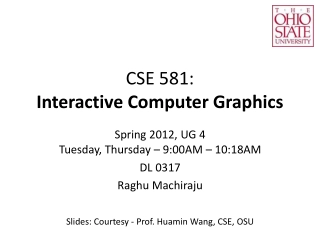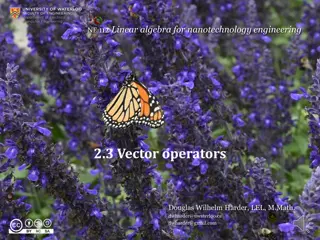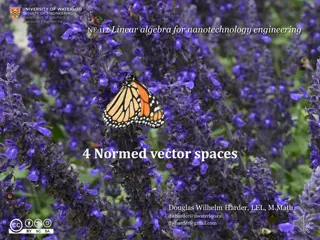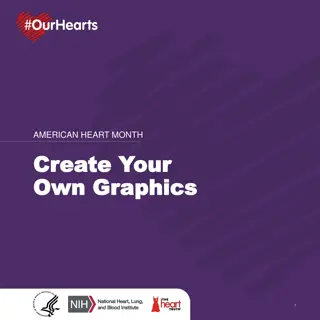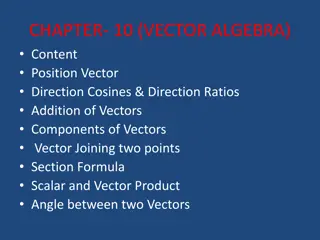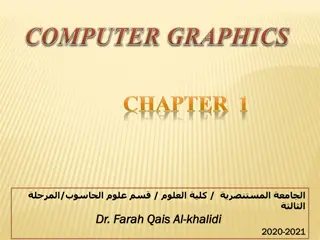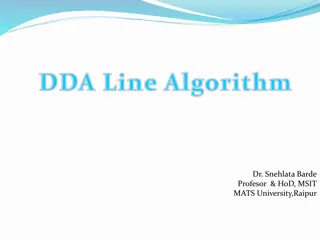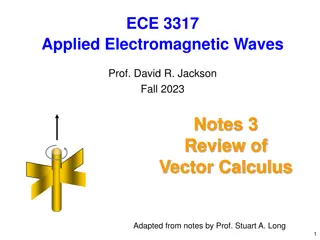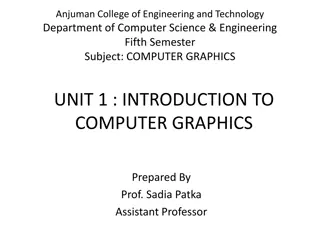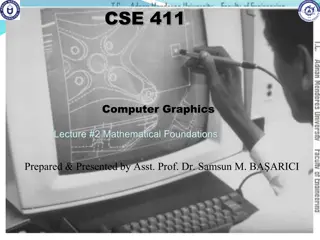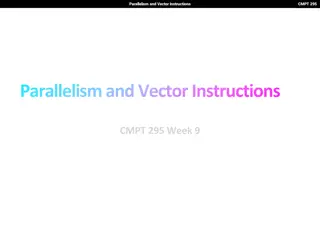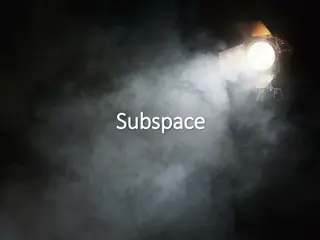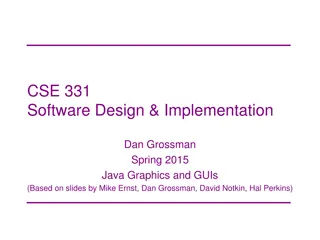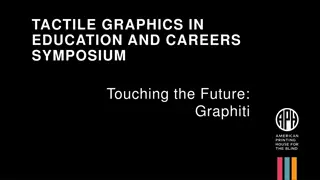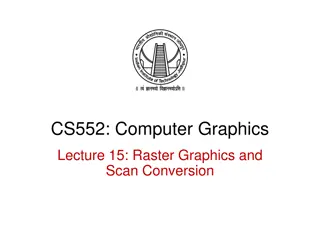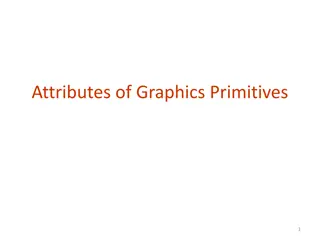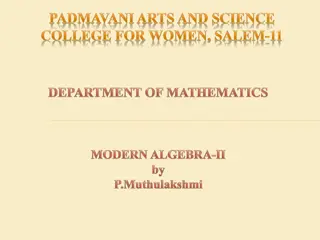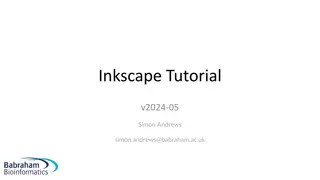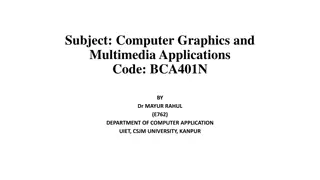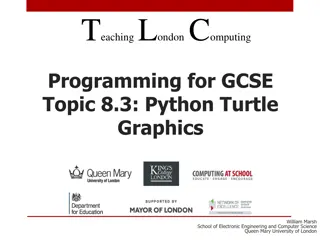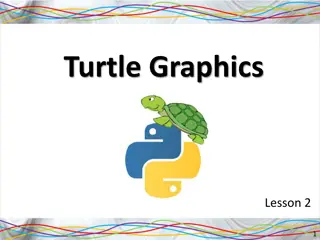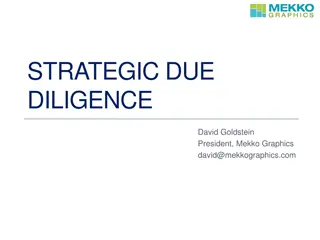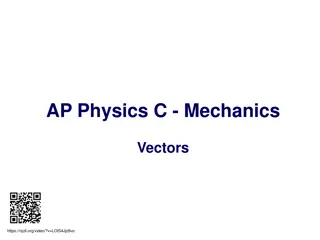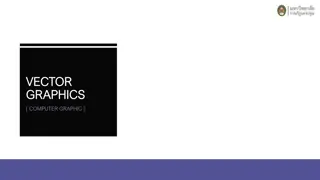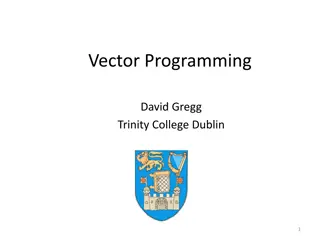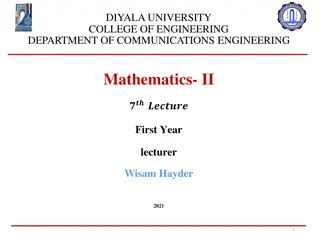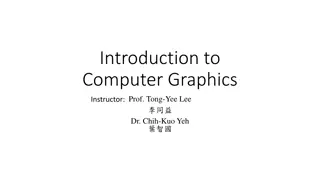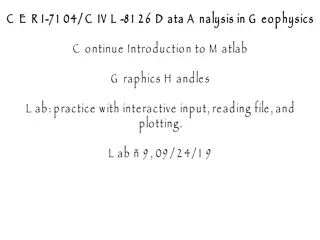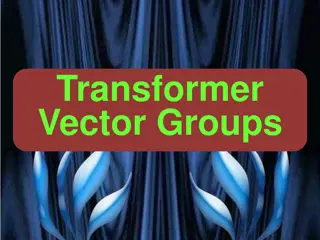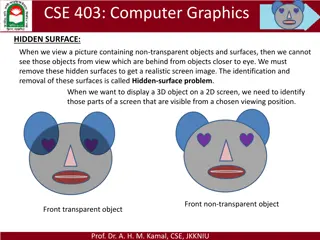Interactive Computer Graphics
This course covers Interactive Computer Graphics, focusing on generating images/videos through computers with applications in gaming, movies, CAD, visual arts, and scientific visualization. Prerequisites include fluency in C/C++, familiarity with linear algebra, and a passion for games. The course i
0 views • 30 slides
Vector Operations in Linear Algebra
Explore the world of vector operations in linear algebra through this detailed presentation. Learn about vector addition, scalar multiplication, field operations, and more. Gain insights into the notation of Fn and the significance of scalar multiplication and vector addition in linear algebra. Whet
8 views • 9 slides
Normed Vector Spaces for Nanotechnology Engineering
Introduction to normed vector spaces, focusing on defining norms for vectors in finite-dimensional spaces, exploring different ways to measure vector length, and understanding the concept of unit vectors and norm properties. This topic equips readers with the ability to calculate vector norms, norma
0 views • 9 slides
Create Your Own American Heart Month Graphics!
Celebrate American Heart Month by creating your own heart-healthy graphics and sharing your message on social media. Use the provided templates to design eye-catching visuals and spread awareness about the importance of living a heart-healthy lifestyle. Follow the steps to customize your graphics, a
0 views • 11 slides
Vector Algebra and Its Applications
Explore the fundamentals of vector algebra, including position vectors, direction cosines, direction ratios, vector addition, scalar product, vector product, and more. Learn about the dot product, cross product, and the angle between two vectors. Visual aids and examples help clarify key concepts in
0 views • 18 slides
Computer Graphics: Evolution and Applications
Computer graphics represent the creation and manipulation of visual information using specialized hardware and software. This field has evolved since the 1950s, enabling diverse applications like entertainment, CAD, education, e-commerce, and computer art. The origins date back to MIT's early displa
1 views • 22 slides
Digital Differential Analyzer (DDA) Algorithm in Computer Graphics
In computer graphics, the Digital Differential Analyzer (DDA) Algorithm is utilized as the basic line drawing algorithm. This method involves interpolation of variables between two endpoints to rasterize lines, triangles, and polygons efficiently. The algorithm requires inputting coordinates of two
1 views • 9 slides
Overview of Vector Calculus for ECE 3317 Course
This overview provides a brief explanation of vector calculus concepts essential for the ECE 3317 course on Applied Electromagnetic Waves. It covers del operator, gradient, divergence, curl, vector Laplacian, vector identities, and their applications in electromagnetic field theory.
0 views • 24 slides
Introduction to Computer Graphics: Overview and Importance
Computer Graphics (CG) involves creating and manipulating images using computers in both 2D and 3D space. This field is crucial in various industries such as science, engineering, medicine, entertainment, and more. CG is utilized for tasks like creating complex diagrams, architectural designs, fligh
6 views • 29 slides
GPU Rasterization and Graphics Pipeline
Delve into the world of GPU rasterization, from the history of GPUs and software rasterization to the intricacies of the Quake Engine, graphics pipeline, homogeneous coordinates, affine transformations, projection matrices, and lighting calculations. Explore concepts such as backface culling and dif
1 views • 17 slides
Mathematical Foundations for Computer Graphics: Geometry, Trigonometry, and Equations
This lecture covers essential mathematical tools for computer graphics, including 2D and 3D geometry, trigonometry, vector spaces, points, vectors, coordinates, linear transforms, matrices, complex numbers, and slope-intercept line equations. The content delves into concepts like angles, trigonometr
1 views • 53 slides
Parallelism and Vector Instructions in CMPT 295
Delve into the world of parallelism and vector instructions in CMPT 295 as you explore fixed-length vector intrinsics, RISC-V concepts, computer programming fundamentals, processor execution processes, scalar and vector loops, and more. Discover the intricacies of memory, data arrays, structs, integ
1 views • 45 slides
Subspaces and Span of Vector Sets
Subspaces are vector sets that satisfy specific properties like containing the zero vector, being closed under vector addition, and scalar multiplication. Examples illustrate these properties and concepts such as the zero subspace and column space. The relationship between column space, row space, a
1 views • 11 slides
Introduction to Java Graphics and GUIs in Software Design & Implementation
Introduction to Java graphics, Swing/AWT libraries, event-driven programming, user interaction, essential terminology, and perspective in software design & implementation using Java. The material covers organization of AWT/Swing library, essential widgets/components, graphics, user events, and build
0 views • 30 slides
Computer Graphics: An Overview
Computer graphics involves creating images and animations using a computer through hardware and software systems. It has evolved significantly over the years, with advancements in generating various types of computer graphics. Learn about the basics of computer graphics, including digital image repr
0 views • 15 slides
Graphics Pipeline Clipping Techniques
Delve into the intricate process of graphics pipeline clipping in computer graphics, from breaking primitives into fragments to determining visible parts for rendering. Explore the necessity of clipping, culling, and endpoint conditions, as well as techniques like Cohen-Sutherland Line Clipping. Gai
0 views • 18 slides
Tactile Graphics in Education and Careers Symposium
This symposium explores the innovative use of tactile graphics in education and careers, showcasing advanced tools like the Graphiti system. The featured physical unit offers a versatile layout with various connectivity options, coupled with enhanced functionality for viewing and editing graphics. P
0 views • 10 slides
Raster Graphics and Scan Conversion in Computer Graphics
This lecture covers various topics related to raster graphics and scan conversion in computer graphics. It includes issues with scan converting a line, generalized line drawing algorithms, and the midpoint circle drawing algorithm. Additionally, it explores deriving mathematical expressions for draw
0 views • 21 slides
Attributes and Color Schemes in Graphics
Graphics systems utilize attributes to define how primitives are displayed, such as color and size, while color and grayscale can be stored in different ways like direct storage and indexed storage schemes. The RGB color components play a key role in determining the color shades, with various color
0 views • 51 slides
Fundamental Concepts in Vector Spaces and Inner Product Spaces
A vector space over a field F is characterized by operations such as addition and scalar multiplication. Subspaces, direct sums, linear combinations, linear spans, dimensions, and dual spaces are fundamental concepts in vector spaces. Moving into inner product spaces, the concept of inner products,
0 views • 13 slides
Complete Guide to Inkscape Vector Graphics Editor
Inkscape is a free, cross-platform vector graphics editor known for its ease of use and suitability for tasks like compositing and drawing. This tutorial covers setting up a canvas, navigation shortcuts, using the main toolbar for various tools, creating basic shapes, applying modifiers, and general
0 views • 21 slides
Installing the Zelle Graphics Package for Python
Learn how to install the Zelle graphics package by downloading the graphics.py file and placing it in the correct location on your PC or Mac. Verify the installation by using the import graphics command in your IDE's Shell window.
0 views • 5 slides
Computer Graphics and Multimedia Applications Overview
This content provides an overview of computer graphics and multimedia applications covering topics such as primitive instancing, sweep representations, boundary representations, and spatial partitioning. It discusses the concepts and methods used in creating three-dimensional objects from two-dimens
0 views • 11 slides
Introduction to Python Turtle Graphics for GCSE Students
Explore the concept of turtle graphics in Python programming through visual representation and simple animations. Learn about the principles of turtle graphics, advantages, limitations, and how to use it effectively for learning programming. Discover the potential challenges and solutions offered by
0 views • 11 slides
Introduction to Turtle Graphics with Python
Explore the world of Turtle Graphics with Python in this interactive lesson. Learn how to use Python to create graphics on the screen, draw shapes using loops, and create a range of shapes. Complete homework assignments and follow step-by-step instructions to start creating your own Turtle graphics
0 views • 24 slides
GIF and file formats in computer graphics
GIF and file formats play a crucial role in computer graphics, defining the structure of images and animations. GIF files consist of a logical screen populated with images or frames, while file formats are divided into segments containing images, extension blocks, and trailers. Extension blocks in G
0 views • 6 slides
Strategic Due Diligence with Mekko Graphics: Empowering Decision-Making
Mekko Graphics, trusted by top private equity firms, facilitates strategic due diligence with its advanced charting features such as Marimekko and Bar Mekko charts. This tool aids in market analysis, competitive positioning, and tracking market trends over time. Utilize Mekko Graphics for comprehens
0 views • 20 slides
Raster Graphics in Computer Graphic Design
Raster graphics, also known as bitmap images, consist of a grid of pixels representing colors, viewable on screens or printed media. They are stored in various file formats and are characterized by width, height, and color depth. Contrastingly, vector graphics are line-based and offer scalability wi
0 views • 7 slides
Vectors in AP Physics C: Mechanics
Explore the fundamental concepts of vectors in AP Physics C: Mechanics, including scalar vs. vector quantities, vector operations, and vector multiplication. Discover the significance of vectors in explaining and predicting physical phenomena through graphical methods and mathematical equations. Div
0 views • 28 slides
Graphics Scene Structures and Rendering Techniques
This content delves into the world of computer graphics, focusing on scene graphs, immediate mode graphics, OpenGL objects, imperative and object-oriented programming models, and Java implementation. It explains the storage and manipulation of graphic scenes, drawing techniques, and different progra
0 views • 21 slides
The Evolution of Motion Graphics: A Visual Journey through Time
Motion graphics seamlessly blend elements of film, animation, and graphic design to create compelling visual stories. Explore the influential works of pioneers like Saul Bass and contemporary artists like Al Boardman. Discover how simple shapes and bold imagery are used to capture the essence of fil
0 views • 20 slides
Vector Graphics in Computer Graphics
Vector graphics in computer graphics are defined by 2D points connected by lines and curves to form shapes. Commonly found in SVG, EPS, PDF, or AI formats, they differ from raster graphics like JPEG or PNG. The W3C standard for vector graphics is SVG, allowing scalable and resolution-independent ima
0 views • 4 slides
OpenGL ES for Android Development
OpenGL ES, a subset of OpenGL, is widely used for graphics rendering on various devices, including mobile phones. The evolution from OpenGL ES 1.0 to OpenGL ES 3.1 is traced, highlighting the differences and improvements in functionality. Android supports different versions of OpenGL ES, providing d
1 views • 43 slides
Vector Programming and Machines
Vector programming involves efficient processing of data through SIMD models, parallel computing, and vector extensions in architectures like SSE and AVX. Programming vector machines in C requires addressing challenges with automatic vectorization related to pointers and data layouts.
0 views • 58 slides
Vector-Valued Functions and Motion in Space
Explore the concept of vector-valued functions and motion in space, including curves, tangents, position vectors, scalar functions, derivatives, and differentiation rules. Learn how to represent curves in vector form and understand the smoothness of a curve based on its derivatives. Gain insights in
0 views • 28 slides
Overview of OpenGL: A Comprehensive Guide
OpenGL, a vital graphics library, was created in 1991 by Silicon Graphics and is now managed by the Khronos consortium. It serves as a language and platform-independent API for rendering 2D/3D graphics, interacting with GPUs. OpenGL offers a rich set of functions and constants, supports applications
0 views • 77 slides
Introduction to Data Analysis in Geophysics using MATLAB Graphics Handles
Practice interactive input, file reading, and plotting in MATLAB Graphics Handles lab. Explore ways to improve graphics in Geophysics data analysis. Learn basic histogram plot representation with properties and understand the functionalities provided in MATLAB for handling geophysical data through g
0 views • 21 slides
Hierarchical vs. Non-Hierarchical Models in Computer Graphics
Dive into the concepts of hierarchical and non-hierarchical modeling in computer graphics. Explore how hierarchical models represent complex objects with explicit sub-part dependencies, while non-hierarchical models treat objects independently. Understand the benefits and challenges of each approach
0 views • 30 slides
Transformer Vector Groups in Transformer Systems
Transformer vector groups play a crucial role in determining the phase relationships between high and low voltage sides in transformer windings. Proper understanding of vector groups is essential for parallel connection of transformers to prevent phase differences and potential short circuits. The a
0 views • 36 slides
Hidden Surface Removal in Computer Graphics
In computer graphics, the hidden-surface problem refers to identifying and removing surfaces that are not visible in a given view to create a realistic screen image. Different methods like Depth Buffer (Z-Buffer) and Scan-Line are used to address this issue by determining the closest visible surface
0 views • 14 slides
